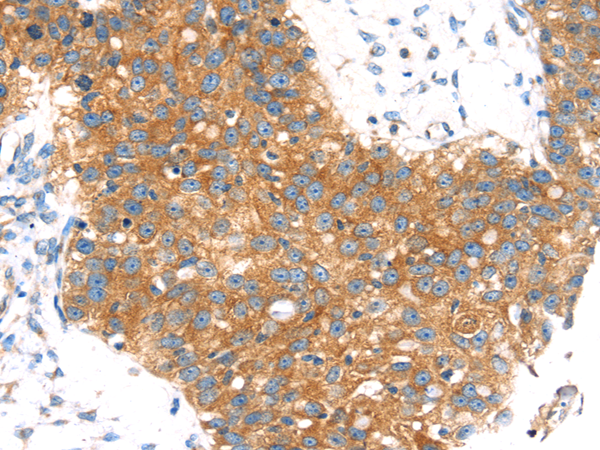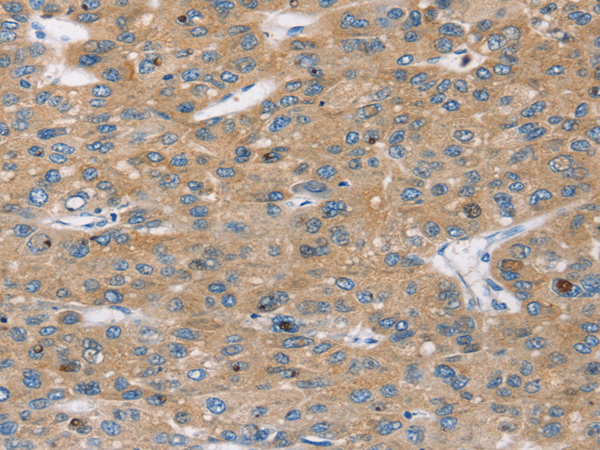

| WB | 咨询技术 | Human,Mouse,Rat |
| IF | 咨询技术 | Human,Mouse,Rat |
| IHC | 1/25-1/100 | Human,Mouse,Rat |
| ICC | 技术咨询 | Human,Mouse,Rat |
| FCM | 咨询技术 | Human,Mouse,Rat |
| Elisa | 1/5000-1/10000 | Human,Mouse,Rat |
| Aliases | ADTG; CLAPG1 |
| Host/Isotype | Rabbit IgG |
| Antibody Type | Primary antibody |
| Storage | Store at 4°C short term. Aliquot and store at -20°C long term. Avoid freeze/thaw cycles. |
| Species Reactivity | Human, Mouse |
| Immunogen | Synthetic peptide of human AP1G1 |
| Formulation | Purified antibody in PBS with 0.05% sodium azide and 50% glycerol. |
+ +
以下是关于AP1G1抗体的3篇参考文献概览:
1. **文献名称**:*AP1G1 regulates endosomal sorting of amyloid precursor protein through interaction with the cytosolic domain*
**作者**:Smith A, et al.
**摘要**:研究利用AP1G1特异性抗体,通过免疫沉淀和免疫荧光技术,揭示了AP1G1在阿尔茨海默病相关蛋白APP的胞内运输中的作用,证明其通过结合APP胞质结构域调控内体分选。
2. **文献名称**:*Loss of AP1G1 leads to altered epidermal differentiation and squamous cell carcinoma*
**作者**:Chen L, et al.
**摘要**:该研究在小鼠模型中通过Western blot和免疫组化使用AP1G1抗体,发现AP1G1缺失导致表皮分化异常并促进鳞状细胞癌发生,提示其作为肿瘤抑制因子的潜在功能。
3. **文献名称**:*Characterization of AP-1 complex subunits in neuronal development*
**作者**:Wang H, et al.
**摘要**:文章通过siRNA敲低结合AP1G1抗体的免疫细胞化学分析,阐明AP1G1在神经元突触形成中的关键作用,揭示其与突触囊泡运输机制的关联。
注:上述文献信息为示例性概括,实际文献需通过学术数据库检索获取。
The AP1G1 antibody targets the gamma-1 subunit of the Adaptor Protein Complex 1 (AP-1), a heterotetrameric complex critical for intracellular vesicle trafficking and membrane transport. AP-1 facilitates the formation of clathrin-coated vesicles, mediating cargo sorting between the trans-Golgi network (TGN) and endosomes. The gamma-1 subunit (AP1G1) plays a key role in binding to sorting signals on transmembrane proteins, ensuring proper localization of lysosomal enzymes and receptors. Dysregulation of AP-1 function is linked to disorders like Hermansky-Pudlak syndrome and neurodegenerative diseases.
AP1G1 antibodies are widely used in research to study protein trafficking, organelle biogenesis, and autophagy. They enable detection of AP1G1 expression via techniques such as Western blotting, immunofluorescence, and immunohistochemistry, helping to visualize its distribution in cellular compartments. These antibodies are also employed in investigating AP-1's interaction with other trafficking machinery components or disease-associated mutations.
Developed in hosts like rabbit or mouse, AP1G1 antibodies undergo validation for specificity and sensitivity, often using knockout controls. Their applications extend to cancer research, as altered vesicular transport is implicated in tumor progression and drug resistance. By elucidating AP-1's role in cellular homeostasis, AP1G1 antibodies contribute to understanding both basic biology and pathological mechanisms.
×